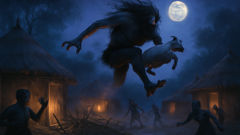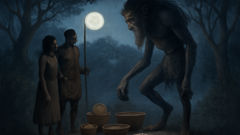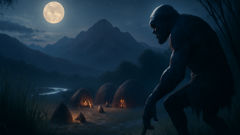Introduction
Among the ochre cliffs and wind-swept grasses of ancient Southern Africa, whispers traveled on the air like seeds on the wind—stories spoken in the hush of twilight, when campfires cast flickering shadows on the earth and the world was thick with mystery. Here, the Khoikhoi people watched the sun slip behind the rugged mountains, its last light pooling in the valleys of the Orange River. For as long as anyone could remember, these lands had been their home: a place where wildebeest thundered across the plains, where lions dozed beneath thorn trees, and where the air sang with the scent of wild sage and dust. Yet, for all their wisdom and harmony with the land, the Khoikhoi harbored a secret dread—an ancient fear that lingered even as the elders recited their oldest songs. It was said that in the deep of night, when the world was silvered by moonlight and silence pressed against the skin, a creature walked the earth, neither wholly spirit nor wholly beast. The Hai-uri. Some described it as troll-like, with rough, stone-colored skin and a mane of tangled hair, its single, powerful leg enabling it to leap as swift as a gazelle or vanish like a shadow into the grass. Others swore it was the size of a man, but with the eyes of a jackal and teeth sharp as obsidian. The stories varied, but the message was always the same: to meet the Hai-uri was to court misfortune, for it was said to hunt the careless, to snatch the unwary from their huts, and to haunt the dreams of those who ignored the old ways. Yet, as with all things, legends change in the telling. And in one remote village where the reeds grew thick by the river’s edge, the Hai-uri’s legend would take on a new face—one shaped by courage, curiosity, and the unbreakable bonds of a people who refused to live in fear. This is the story of that village, and of the night when the Hai-uri came.
The Night the Shadows Moved
The night began like any other. In the village of Gai-Khoen, huts of woven reeds clustered close together as if for comfort, and fires glowed in their centers. Children chased fireflies along the edge of the water, their laughter mixing with the croak of frogs and the rustle of wind in the grass. The air carried the smell of roasting meat and wild herbs. Life moved with a gentle rhythm, old as the river itself.

Yet as darkness settled, a hush crept in—so subtle, so soft, that only those who had lived many seasons would notice. The wind slowed, the insects stilled, and the very stars seemed to hold their breath. In his hut, Ouma Teis—the eldest of the village—rocked gently, his eyes half-closed as he listened for the sound of returning hunters. Next to him sat his granddaughter, !Nanni, her face aglow with curiosity. She was young, barely into her womanhood, and known for her sharp eyes and quick tongue. Tonight, though, even she was subdued.
Ouma Teis cleared his throat. "Do you feel it, little one? The way the world grows quiet when old stories are ready to walk again?"
!Nanni nodded, glancing nervously at the leather curtain that served as their door. "Is it the Hai-uri?"
He smiled, a brittle thing. "The Hai-uri walks when people forget to be careful. It is the shadow that follows you home, the voice that tells you to look behind. We respect it—not for its strength, but for what it reminds us: that we are small, and the world is wide."
Outside, the wind began again, but different—carrying with it a low, rhythmic thumping, as if a giant heart beat against the earth. The hairs on !Nanni's arms rose. The noise grew, sometimes stopping suddenly, then resuming in a slow, measured pace. Thump...thump...thump. A sound that was both distant and terribly near. Dogs cowered under the huts, and even the bravest children scuttled to their mothers' sides.
From the edge of the reeds, something shifted. A shape, hunched and massive, moved with unnatural grace. The moonlight revealed flashes of a twisted face, wild hair, and a single leg thicker than a tree trunk. Eyes glowed like embers as it paused, sniffing the air. It was the Hai-uri—closer than any had ever seen, its breath fogging in the chill night.
Panic threatened, but Ouma Teis raised a gnarled hand. "No screams. It comes when there is fear."
But the village was already stirring. A hunter named Kubi, tall and broad-shouldered, crept toward the edge of the clearing with a spear in hand. He was known for his courage—some said recklessness—and his devotion to the old ways. Behind him, others gathered rocks and sticks, their faces set in grim lines. The Hai-uri’s legend was no bedtime story tonight; it was flesh and shadow, hunger and menace.
The creature moved again, leaping with terrifying speed toward a goat pen. With a crash, the enclosure gave way. Goats scattered, bleating, as the Hai-uri seized one in its claws. The villagers shouted, some running forward, others back. Kubi hurled his spear with all his might. The weapon struck true—glancing off the creature’s shoulder and splitting the air with a metallic clang. The Hai-uri bellowed, a sound that made the earth itself seem to tremble. It turned, its eyes sweeping over the villagers with furious intelligence.
But it did not attack. Instead, it leapt away—bounding in long, graceful arcs, the stolen goat held high. Within moments it vanished into the night, leaving chaos and fear in its wake. The fires flickered uncertainly as people gathered, voices low and urgent. Ouma Teis drew !Nanni close. "Tonight is not the end. The Hai-uri never leaves empty-handed. It takes, and it tests. If we cower, it will come again—and next time, it may not be satisfied with a goat."
In that hour, the village knew fear as an old companion. Yet in the heart of !Nanni and a few others, a different feeling was born—a stubborn resolve, fierce as the thorns that ringed their homes. For if the Hai-uri could walk among them, then so too could courage.
!Nanni’s Pact and the Hunter’s Test
The following day dawned with a wary silence, as if the village itself waited for a sign. The villagers found hoofprints scattered along the riverbank, deep and solitary—a pattern unmistakable to those who knew the old tales. Where two-legged beasts left pairs of prints, these tracks appeared one after another, as if made by a single, monstrous foot. Blood stained the grass, but there was no sign of the stolen goat or the Hai-uri’s passage beyond the reeds.

Whispers spread like wildfire. Some urged moving the camp, others called for more weapons. Yet Ouma Teis’s voice rang out above the rest. “You cannot run from what haunts your heart. There must be balance. We have forgotten the ways of respect.” He looked at !Nanni, his eyes grave. “You are clever and brave. If you wish to know the truth of the Hai-uri, you must see it not as a beast, but as a question that must be answered.”
!Nanni felt the weight of expectation settle on her shoulders. That evening, she packed a small satchel—dried meat, bitter roots, a polished river stone carved with protective symbols—and painted streaks of ochre across her cheeks. She would not go alone. Kubi insisted on accompanying her, his pride stung from the night before. Together, they slipped away at dusk, following the solitary footprints through the whispering grass.
The moon rose pale and watchful. The air cooled. As they reached the edge of a thicket, Kubi motioned for silence. “You have heard my spear’s song,” he muttered, “but this is a creature that answers to neither weapon nor prayer.”
!Nanni crouched, studying the patterns on the ground. A faint scent lingered—animal and strange, threaded with something sour and sharp. “Stories say it can smell fear,” she whispered. “And that it tests those who cross its path.”
They pressed on, deeper into unfamiliar territory. The river curved away, replaced by thorny shrubs and ancient rocks painted with lichen. Soon, they found a clearing where the earth was churned and a circle of stones surrounded a dark hollow. Kubi tensed, raising his spear.
Out of the shadows, the Hai-uri appeared.
It stood taller than a man but hunched, balancing effortlessly on its single leg. Its skin shimmered with a faint, unnatural sheen; its hair tangled with feathers and scraps of hide. The creature’s face was both bestial and oddly human—eyes bright with intelligence and sorrow. It regarded them with a wary curiosity.
Kubi lifted his weapon, but !Nanni stepped forward, palms open. “We seek to know you,” she called in the old tongue. “Not as an enemy, but as a teacher. Why do you haunt us?”
The Hai-uri cocked its head. Then, to their astonishment, it spoke—a deep voice that rumbled like thunder over water. “Long have I watched. You take from the earth without asking. You have forgotten the pact your ancestors made: to share, not to own.”
Kubi bristled. “You steal our goats and frighten our children! We must protect our own.”
The creature’s eyes narrowed. “The goat was a test. You would raise weapons first, speak after.”
!Nanni hesitated, then reached into her satchel and offered the river stone. “We do not wish for war. What will restore balance?”
The Hai-uri leaned closer, its breath cold and damp. “Three nights hence, I will return. Bring an offering—a gift that shows you remember your place in this world. If you fail, I will take what I must.”
With a leap, it vanished into the night.
Kubi and !Nanni returned to the village, minds racing with fear and hope. The elders listened to their tale and debated what offering would satisfy such a being. Some argued for food, others for weapons or carvings. Ouma Teis shook his head. “It is not about what we give, but why. The Hai-uri is old as the land itself—a spirit of balance. We must show we have not forgotten to honor what sustains us.”
On the third night, as the moon waxed full and silvered every blade of grass, the villagers gathered near the thicket. They carried baskets of wild honey, woven mats, beads shaped from river shells—tokens not of wealth, but of gratitude. !Nanni led them in song, her voice rising in a hymn to the earth and all its creatures. The air trembled.
The Hai-uri appeared—silent as mist, luminous in the moonlight. It examined each offering with solemn care. At last, it nodded. “You remember. For now, there is peace. But never forget: what is taken without thanks will be taken back.” With a final, powerful leap, it was gone, leaving behind an unspoken promise: so long as the people remembered respect and balance, they would be safe from darkness—both outside their village and within their own hearts.
Conclusion
In the years that followed, the story of !Nanni and the night of the Hai-uri became a cherished legend among the Khoikhoi. Children grew up knowing not just to fear the darkness, but to respect it—to listen to the land and remember that every shadow holds both danger and wisdom. The village flourished by the river’s edge, its people greeting each dawn with songs of gratitude and each night with quiet courage. Though the Hai-uri was rarely seen again, its presence lingered in the quiet spaces between stories—in the hush before a storm, in the flicker of a campfire, in the silent watchfulness of those who understood that courage is not the absence of fear, but the will to face what lies beyond it. The legend endured, reminding each generation that true guardianship of the land and each other begins not with weapons or walls, but with humility and heart. The Hai-uri became more than a monster—it became a symbol of balance, of the fragile peace between humanity and the mysteries of the world. And so, under moon and stars, the Khoikhoi lived with a deepened sense of wonder: forever listening, forever learning, forever unafraid to seek the truth behind even the wildest tales.













